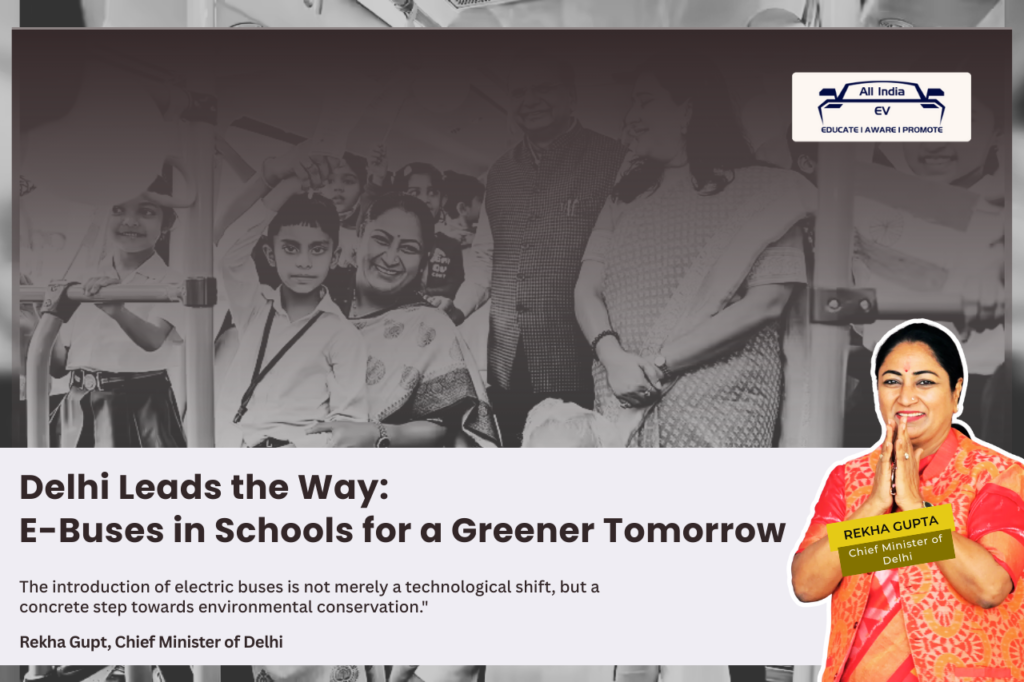
Delhi CM Gupta Flags Off Electric School Buses, Calling Them a Crucial Step Beyond Technology Toward Pollution Control and Environmental Conservation
Delhi Chief Minister Rekha Gupta, joined by Lieutenant Governor V.K. Saxena, on Tuesday flagged off a fleet of electric buses at Sardar Patel Vidyalaya, marking a major push toward cleaner, greener school transport in the capital.
Speaking at the launch, CM Gupta said the initiative is part of the Delhi government’s broader plan to reduce vehicular emissions. “School buses form a large segment of vehicles running on Delhi’s roads, and we want them to go electric. Delhi Transport Corporation (DTC), under the state government, has partnered with Sardar Patel Vidyalaya to provide air-conditioned, comfortable electric buses for students,” she said.
Senior officials confirmed that similar partnerships with other schools are planned in the coming months. The pilot project aims to demonstrate how school transport electrification can significantly reduce pollution and traffic congestion.
Delhi and Oslo Launch ‘DOSTI’ Partnership to Boost Urban E-Mobility
“True progress lies in living in harmony with nature”
Highlighting the government’s commitment to sustainable urban transport, Gupta said:
“This is not just a technological shift; it’s a concrete step toDelhi and Oslo Launch ‘DOSTI’ Partnership to Boost Urban E-Mobilitywards environmental conservation. By providing electric buses to schools, we are ensuring that children travel in pollution-free vehicles, safeguarding both their physical and mental health.”
Lieutenant Governor Saxena praised the Delhi government’s efforts, noting that CM Gupta had taken “commendable steps” in improving air quality within just six months of taking office. He expressed confidence that Delhi will undergo a “remarkable transformation” in the next two to three years as more institutions adopt electric transport solutions.
Tangible benefits for students and the city
The new electric buses will carry nearly 1,200 students daily, replacing 400–500 private vehicles during school commutes. This reduction is expected to lower vehicular emissions and ease peak-hour congestion in central Delhi.
Saxena added, “If all schools and colleges take similar initiatives, we can make significant progress in combating pollution. This is not just about cleaner air — it’s about building a healthier future for our children.”
Gupta reaffirmed that tackling pollution remains one of her government’s top priorities. She urged all schools across Delhi to transition to electric buses, emphasizing that collective action will be critical to making Delhi’s air cleaner and safer.
Engaging children in sustainability
To further raise awareness, CM Gupta announced that the Delhi government will organize environment and sustainability-themed competitions across schools. The aim is to help students understand their responsibility toward nature and inspire them to carry these values into adulthood.
“Our vision is to nurture young minds who appreciate the importance of protecting the environment. True development is about living in harmony with nature, not at its expense,” Gupta said.
A model for urban India
With this launch, Delhi joins the growing list of Indian cities deploying electric buses for mass and institutional transport. Experts believe such initiatives can serve as a blueprint for other urban centers grappling with poor air quality.
As Delhi prepares to scale up its electric mobility infrastructure, the introduction of e-buses for schoolchildren sends a strong signal: clean transportation is not a distant dream — it’s happening now.










